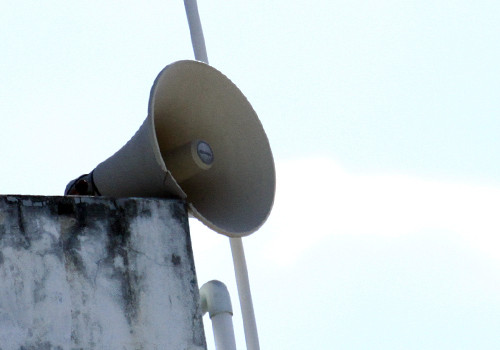Radio station in Thua Thien - Hue is affected by Chinese interference
Phu Loc District (Thua Thien - Hue) is the second locality after Da Nang to record Chinese language interference.
On the afternoon of July 19, Mr. Duong Dang Nhan, Head of Phu Loc District Radio and Television Station, said that the station's leaders had sent a document to the People's Committee of Phu Loc District and the Department of Information and Communications of Thua Thien - Hue Province to report that the radio broadcasting system in the area was contaminated with Chinese language waves.
According to Mr. Nhan, the radio system has been infected with Chinese waves for nearly a month now in Phu Loc town and Loc Tri commune (Phu Loc district). These two localities have 14 clusters with 28 public loudspeakers broadcasting directly from the district radio station. The insertion of Chinese waves (both male and female voices with unknown content) occurred on the wired (wireless) loudspeaker system at the 98 MHz band with the FM wave system broadcasting directly from the district radio station.
The head of Phu Loc station said that the phenomenon of Chinese language interference does not occur during main broadcasting times but when the station is off-air.
“On the morning of July 12, after the station finished its morning broadcast, the staff and workers at the station clearly heard a male voice speaking Chinese coming from the station’s loudspeaker system but could not understand the content. This was the clearest time we heard the voice since recording the signal interference phenomenon,” said Mr. Nhan.
On the same afternoon, Mr. Le Van Thong, Vice Chairman of Phu Loc District People's Committee, said he was aware of the incident and contacted the frequency management unit to check for Chinese interference.
Speaking to VnExpress, Mr. Truong Cong Hanh, Deputy Director of the Radio Frequency Center of Region III, said he had received information about loudspeakers in Hue being interfered with similar signals as in Da Nang through the press.
According to Mr. Hanh, the Center has not yet received any interference, so it has not yet determined the location of the transmitter causing the interference or signal insertion. "When people reported it, we monitored it and there was no interference, so it was difficult to determine. If we received the signal at the exact time the station was being interfered with, we could determine it immediately," Mr. Hanh said.
To overcome the problem of wireless radio stations in Ngu Hanh Son (Da Nang) being interfered with and having their signals jammed, Mr. Hanh said that in the near future, an encoding filter will be installed so that when the station transmits, it can only receive waves in the water; the receiver threshold will be raised and the direction of the transmitting and receiving antenna will be adjusted.
 |
| The loudspeaker cluster in Khue My ward (Ngu Hanh Son district, Da Nang) has to be unplugged due to interference from Chinese signals. Photo: Nguyen Dong. |
The Regional Radio Frequency Center III said that the propagation of radio waves in space is borderless and very complex. Recently, the Regional Radio Frequency Center III has received and handled many interference cases due to the influence of weather factors, creating abnormal wave transmission paths, making V/UHF radio waves able to transmit very far.
This phenomenon is called convection waveguide - a type of wave transmission medium. V/UHF radio waves transmitted in this medium have very low attenuation so they can travel very far, more than 1,000 km, even more than 2,000 km. In fact, there have been some cases proving this super transmission phenomenon, but most of them are FM signals and television signals.
The above phenomenon occurs most often in coastal areas adjacent to open seas. Therefore, it is possible for V/UHF radio waves from China or other countries to propagate and cause interference through the above-mentioned waveguide mechanism. In these cases of interference, it usually only occurs seasonally, in a very short time, and the level of impact is not much.
Previously, speaking with VnExpress on the afternoon of July 18, Mr. Phan Thanh Liem, Head of the Ngu Hanh Son District Radio Station (Da Nang), confirmed that the radio station in the area had its Chinese language broadcasts interrupted since May 21, but only in one cluster (2 speakers) in group 96, Khue My ward.
According to Tuoi Tre
| RELATED NEWS |
|---|



